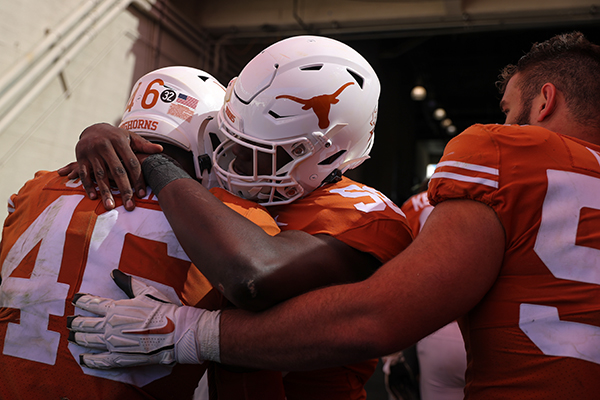College athletes have a difficult dilemma on their hands.
If they play sports this fall, they’ll be at risk of heart conditions and lung issues — maybe even death. On the flip side, if athletes don’t participate, their mental health and emotional well-being could spiral, psychologists say.
“While having coronavirus is worse, (not playing sports) is a real psychological loss that’s happening to these students’ lives at critical stages of their development,” educational psychology professor Aaron Rochlen said.
Athletes understand the impact not playing could have. Texas senior quarterback Sam Ehlinger has advocated for his presumed final college football season, saying last week that he feels players are safer on campus under the University’s COVID-19 protocols than they would be at home.
With threats of myocarditis and other health issues looming over the upcoming season, medical experts are debating whether Ehlinger and others’ claims are accurate, and psychologists are considering the effects a lost season could have on college athletes.
The loss could be significant, Rochlen said, as time away from sports could stunt an athletes’ personal growth and lead them astray.
“You do find athletes and college students in general starting to pull themselves into other, sometimes troublesome behaviors,” Rochlen said. “It can be drugs and alcohol or can be social isolation or can be not hanging out with positive influences and teammates, so that can come with a whole host of mental health challenges.”
Rochlen said sports provides athletes with a structured and supportive environment, something Carlton Dixon, a former Texas basketball player, said he benefited from during his time at UT from 1994-1998.
“We really didn’t lack for anything,” Dixon said. “The study environments were set up to where we could go somewhere, access computers, internet. The resources were there, and if there weren’t resources there, they would go find them for us.”
Rochlen said athletes impacted by the pandemic could experience an identity crisis that typically occurs in individuals after they leave their sport.
“If it’s hard for those athletes that are transitioning out of their senior year, it’s even harder for this situation because nobody saw this coming,” Rochlen said. “When the sport is taken away suddenly in a very dramatic way with these added health risks, that student-athlete identity and how they see themselves is quickly fractured.”
Because UT’s sports teams are still set to compete this fall, senior defensive lineman Ta’Quon Graham said last week that he hasn’t thought about how he would cope if the football season is canceled. Instead, he’s focused on leaving the Longhorns with a bang.
“As a 2017 class, we came in here and we helped establish the culture throughout all these years with these different classes rolling in, and I feel like something we look forward to accomplishing is finally making that extra step and putting Texas back on top,” Graham said. “We’re not done yet until we play our final season.”
Ehlinger shares Graham’s sentiments on leaving a legacy at Texas, which he said was his main goal entering college. But this year, college athletes aren’t guaranteed this closure, which could be detrimental.
“In football, when the coach brings all the families out to the field and gives them flowers, that’s not just a nice photo opportunity,” Rochlen said. “That brings psychological closure to a student-athlete’s career. Now those student-athletes are being slapped in the face with a lack of opportunity to close out their careers and say goodbye to an important part of their lives.”















